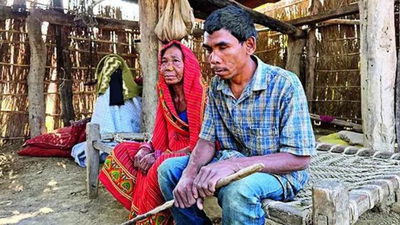ARTICLE AD BOX

Surdas Ram Bhajan (40), who has been blind since birth, is among those named in FIRs. ‘I have never even seen the forest,’ he says
BAREILLY: A blind man was booked for hunting deer, a mentally ill man shackled since childhood was accused of cutting down trees, and a man who cannot walk was charged with climbing a tree to destroy nests.
These are not isolated errors but part of over 4,000 forest crime cases filed in 2012 against members of the Tharu tribal community in Lakhimpur Kheri district, during the Samajwadi Party government's tenure. Many of the accused continue to appear in court more than a decade later.Among those named in FIRs is Surdas Ram Bhajan (40), who has been blind since birth. "I have never even seen the forest," he said. "I walk with my 70-year-old mother's help.
My younger brother, Rajjan, has a mental disability and has been in chains since childhood, yet both of us were booked." Rajjan, 37, was accused of illegal tree cutting. Their mother, Gulaboo Devi, said, "My sons never even went to the forest, but the department trapped them in false cases.
"Har Dayal Singh, 55, who has a chronic spinal disorder, was charged with climbing trees to destroy bird nests. "They say I climbed a tree.
Maybe in my next life. Right now, I can barely stand," he said. Village priest Karm Lal was also booked - in his case, for selling wild meat. "I haven't left the village in years. I don't know the forest or the market," he said.The Tharu community, an indigenous group native to Terai region of UP, Uttarakhand, Bihar and southern Nepal, has historically relied on farming and forest-based livelihoods. After Dudhwa was declared a national park in 1977 and upgraded to a tiger reserve in 1988, several Tharu villages ended up within or alongside protected forest zones, losing access to land and resources.
Although Forest Rights Act of 2006 aimed to provide legal rights to scheduled tribes and forest dwellers for habitation, cultivation and forest use, many Tharu claims filed in Lakhimpur Kheri were rejected or left pending.BJP MLA Romi Sahani from Palia constituency said the mass registration of cases in 2012 followed a petition filed by a Tharu union seeking legal recognition of their forest rights. While the matter was still being heard, a group of locals entered the jungle to collect fallen firewood.
"The forest department took the voter list and charged nearly every resident," said Sahani. "They filed cases not only against those who went in the forest, but also people who never left home, the physically incapable, and even the dead.
" Shahni has raised the matter with CM Yogi Adityanath.In Sariya Parah, where the population is around 1,500, at least 375 were booked under various provisions of Indian Forest Act and Wildlife (Protection) Act.
Village pradhan Ram Bahadur has 29 cases against him, of whi-ch he has got bail in 26. "I have spent more than Rs 9 lakh on legal expenses and had to borrow Rs 3.5 lakh to keep up with the cases," he said.Badhana Devi, 70, said she had spent five decades praying at home but was accused of selling liquor and wild meat. "If we raise our voices or refuse to pay when officers come, we are threatened with new cases," she said.Many villagers said they were not informed or notified before being charged.Despite multiple representations over the years to forest officers and elected officials, little action was taken until recently. Raja Mohan, field director of Dudhwa Tiger Reserve, told TOI that while charge sheets had been submitted earlier, the department is now revisiting the matter. "We will comment after the review," he said.Last month, gram pradhans from seven Tharu villages met Adityanath in Lucknow and urged him to intervene. The CM assured them that the matter would be formally investigated and relief provided to those who were falsely implicated.(Inputs from Dharmendra Rajpoot in Lakhimpur Kheri)

 2 hours ago
5
2 hours ago
5








 English (US) ·
English (US) ·